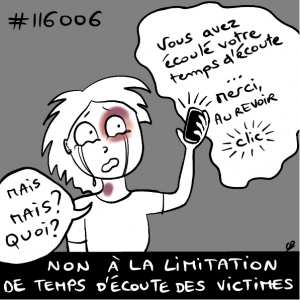Being a victim of crime can be scary and seriously affect someone’s life. It is a traumatic experience that may produce physical, emotional and psychological impacts. Difficulties in accessing support and the right information can be an additional source of stress and a complex journey.
This is why a victim support helpline is internationally recognised as a fundamental element in a country’s victims support framework. These helplines are essential to victims as a first contact point with a trained professional who will listen to them, advise them, provide an initial level of support and refer them to the services they need.
Recognising this, in 2009, the European Union reserved the number 116 006 for helplines assisting victims of crime. Today, 13 EU countries operate such a helpline with the ambition that in the coming years all Member States will operate the European helpline 116 006.
But it’s not enough that these helplines exist. They have to work for victims – be designed with their needs in mind.

Source: Catherine Bertrand (@Cathbertrand5) Twitter
So imagine for a second that you’ve fallen victim to a crime. You desperately need help and advice, so you call 116 066. Someone really nice answers the phone. They start off listening carefully to your story, looking to provide you with advice and support. But as you start opening up, after about five minutes, the support worker seems to be getting impatient. Answering more shortly, making hints about ending the call. After 6 minutes, during which you only had the time to explain what happened and ask a few questions, you feel like you have to end the call. You don’t want to but it seems your time is up.
Six minutes to open up about your terrible experience, to be heard, understood and to get the information and help you need. You ask why they have changed. They apologise and say most calls have to finish within 6 minutes and they’ve already taken many other longer calls. If they don’t get back on track, they risk being fined by the Government.
You find this story crazy?
This is what almost happened in France, when the French Government published a new tender for the funding of the 116 006 helpline in May 2021 with a requirement that “the average call duration should be less than 6 minutes for 80% of calls and 9 minutes for the remaining 20% of calls.”.
The requirements came as a shock not only to France Victimes which currently runs the helpline in France but to all 13 organisations in the EU running the 116 006 helplines. France Victimes quickly responded nationally as well as seeking help from Victim Support Europe.
Through speedy action – an administrative appeal, a letter to President Macron, a petition that gathered more than 18 000 signatures and pressure in the national press, the French Government listened and decided to not pursue the limitation of the duration of calls.
They didn’t act alone however. In a true demonstration of solidarity, all 116 006 operators as well as other helpline services came together to support the calls for a change. VSE co-ordinated action seeking out relevant data from its Centre of Excellence members (organisations running a 116 006 helpline in Europe) and preparing a joint letter to President Macron to show their solidarity for France Victime’s position and to express their concerns over the restrictions. The letter reminds us all of the importance of having quality standards and a victim-centric approach when running a victim’s helpline.
The letter was founded on the extensive operational knowledge of the 15 participating organisations. The concerns raised originally by France Victimes, are based on its three years successfully running the 116 006 helpline as well as 20 years running its own 08Victimes helpline.
Organising helplines in an efficient manner, to a recognised set of standards, and which maximises the number of victims accessing the service must remain a priority for all Member States. Yet this must not compromise quality. Efficiency objectives should not drive a race to the bottom. Victim helplines cannot be measured as a customer service helpline in the private sector. The primary objective of a helpline is to support victims of crime and respond to their needs, regardless of the amount of time it might require.
We need to remain vigilant that victim support remains in the hand of specialist organisations that have long standing experience and expertise in supporting victims of crime. We also encourage more support organisations to take up the responsibility of running a 116 006 helpline in their country to ensure that all victims in the EU have an equal access to support.
Yet we know that finding the funding for operating these lines is difficult. Today, 13 EU Member States have an operational 116 006 helpline, and 12 of them rely on governmental funding to function. This is why it is critical that leading States like France adopt a best practice approach to the funding of their helplines.
It is also why VSE continues to call on the European Union to fund the initial set up of 116 006 helplines. As our position paper explains, this approach has successfully resulted in all 27 Member States running a similar helpline for missing children. There is no reason why sustainable and accessible EU and national funding should not also be available to run 116 006 helplines for victims of crime.

